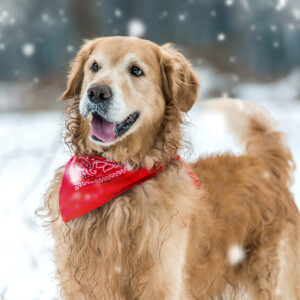
Utilizing some holiday safety tips for pets can help you ensure a safe and joyful holiday season for everyone involved.
The holiday season brings joy, decorations, and plenty of gatherings, but it can also present new hazards for our furry friends. Pets are often curious about changes in their environment, which means they may sniff, chew, or even ingest things that could be harmful to them. By following a few safety tips, you can keep your pets safe and comfortable through the holiday season, allowing everyone to enjoy a festive and worry-free time.
Watch Out for Dangerous Foods
The holiday season brings an abundance of delicious treats, but many human foods are dangerous for pets. Chocolate, alcohol, onions, garlic, grapes, raisins, and foods containing the artificial sweetener xylitol can be toxic to pets, leading to symptoms that range from mild stomach upset to severe illness. Additionally, rich and fatty foods, like turkey skin or gravy, can cause pancreatitis in pets, a potentially life-threatening condition.
Keep all holiday treats out of reach, and make sure guests know not to feed your pets any table scraps. If you want to include your pet in the holiday feast, opt for pet-safe treats, or prepare small portions of plain, unseasoned meats or vegetables.
Decorate Mindfully
Holiday decorations are beautiful but can pose a variety of risks to pets. Tinsel, for example, is particularly appealing to cats but can be dangerous if ingested, as it may cause severe digestive blockages. Ornaments made of glass or other breakable materials can shatter, creating sharp fragments that might cut your pet’s paws or mouth.
Opt for shatterproof ornaments and place breakable items higher up on the tree. For string lights, ensure that cords are tucked away and secured, as pets may chew on them, risking electric shock. Wrapping cords with protective covers or using bitter spray deterrents can help reduce the risk of curious chewers.
Secure Your Christmas Tree
For many, the Christmas tree is the centerpiece of holiday decor. However, it’s also a new climbing or play structure for many pets. Cats and small dogs may try to climb the tree, and larger dogs might knock it over accidentally.
To prevent accidents, secure your tree to the wall or use a heavy, stable base. Many pet owners also opt for gating off the tree to keep pets at a safe distance. Additionally, avoid using any chemical preservatives in the water, as pets may drink from the tree stand. Tree water often contains fertilizers or sap that can cause stomach upset or worse if ingested. Cover the water with a tree skirt or foil to discourage drinking.
Avoid Toxic Holiday Plants
Several popular holiday plants, such as poinsettias, holly, mistletoe, and amaryllis, are toxic to pets. Poinsettias can cause mild irritation, while mistletoe and certain lilies can be far more dangerous, causing severe symptoms like vomiting, diarrhea, and even kidney failure in some cases.
Consider using artificial plants to avoid the risks, or keep real plants in areas that are completely out of your pet’s reach. If you believe your pet has ingested a toxic plant, contact your veterinarian immediately for guidance.
Be Cautious with Candles and Fireplaces
Candles and fireplaces add warmth and ambiance to the holiday season but also pose burn and fire hazards. Curious pets may jump onto surfaces with lit candles, risking burns or tipping candles over. Open flames from fireplaces also need to be monitored, as pets might get too close and singe their fur.
Use battery-operated candles whenever possible for a pet-friendly alternative. If you’re using real candles or have a fire going, make sure to keep your pets away from these areas, either by supervising closely or using pet gates to block access.
Create a Pet-Safe Space
Holidays often mean more people in your home, which can be overwhelming or stressful for pets. A pet-safe space with their bed, favorite toys, and water can give them a quiet place to retreat. This space can be a separate room or a quiet corner where they can relax and avoid the noise and excitement of holiday gatherings.
Make sure that well-meaning guests understand the importance of leaving your pet alone in their safe space if they’re resting, especially children who may want to pet or play with them.
Beware of Wrapping Paper and Gift Hazards
Wrapping paper, ribbons, bows, and small gift items can be choking hazards or cause digestive blockages if ingested. Cats, in particular, are attracted to ribbon and may chew or swallow it, leading to serious complications.
When unwrapping gifts, keep an eye on your pet, and dispose of all wrapping materials promptly. If your pet receives their own gifts, make sure they’re pet-safe and supervised while playing with new toys to avoid accidental ingestion of small parts.
Trust Maryland Veterinary Surgical Services With Your Companion’s Health
Your companion’s health is important, and the team at MVSS is ready to provide the best care possible for your furry family. We are dedicated to combining comprehensive exams and assessments with informative and honest discussions of your companion’s care. Once we have worked with you to decide on the best course of action for your dog, our professionals will use their surgical expertise to work towards the goal of giving your companion an active and pain-free life. We are proud to serve loyal companions in Catonsville and Baltimore. To learn more about our services, give us a call at 410-788-4088 or visit us online. For more information and tips for dog health, follow us on Facebook and Pinterest.
